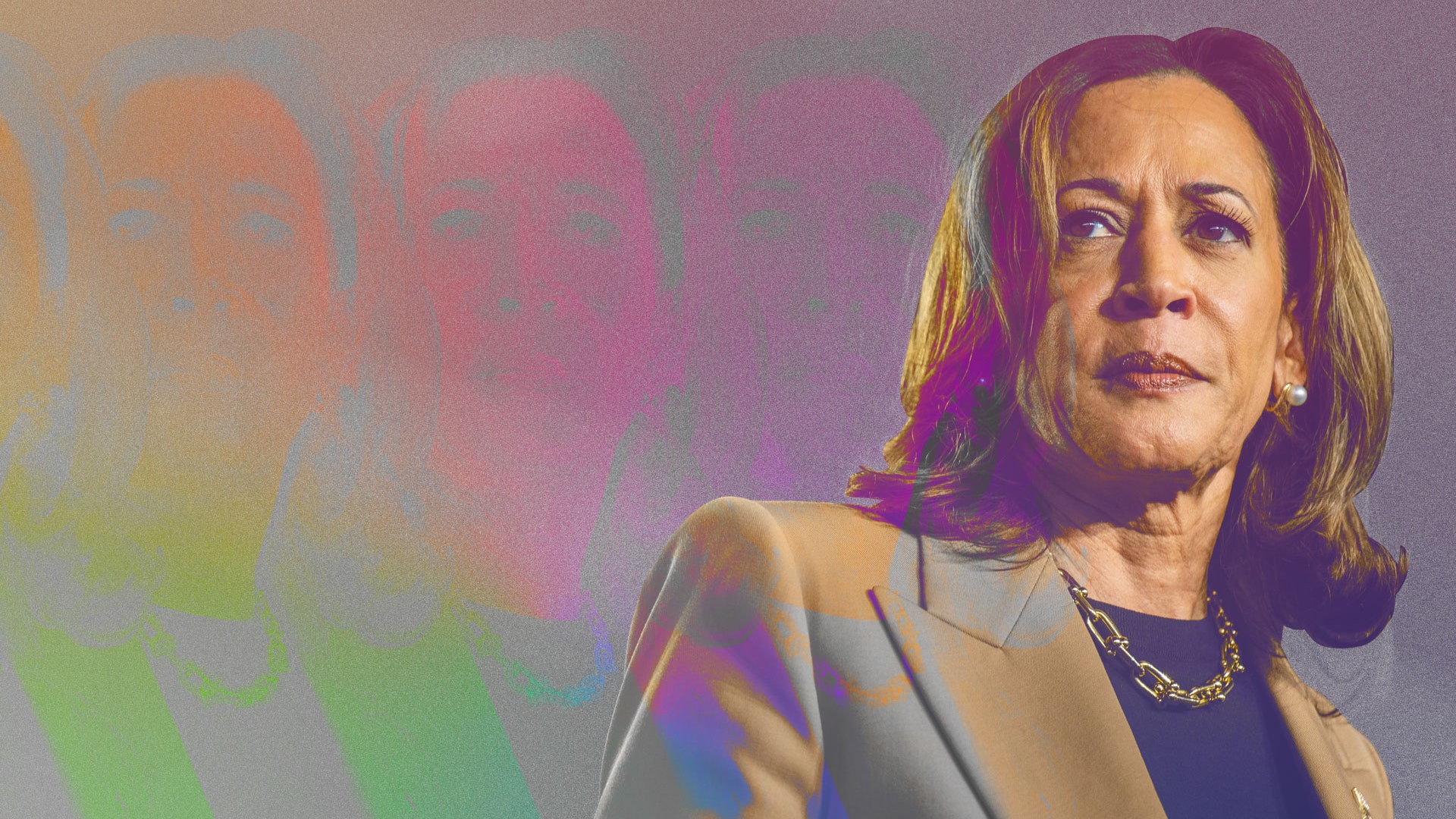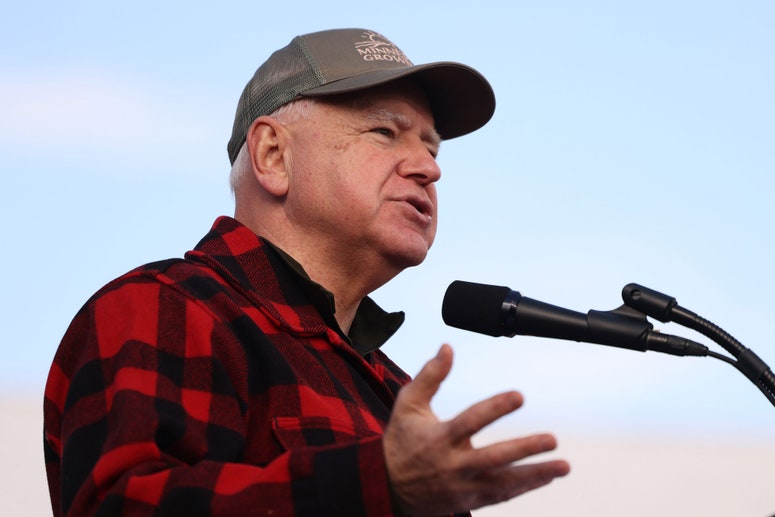Sign up for The Agenda — Them's news and politics newsletter, delivered to your inbox every Thursday.
With less than a month until the 2024 presidential election, Vice President Kamala Harris has been much quieter on LGBTQ+ issues than she has throughout her storied political career. Despite presenting a robust slate of LGBTQ+ policies in 2020, Harris has seldom addressed queer and trans equality on the campaign trail, and her current LGBTQ+ platform is far more modest.
This week, Harris was pressed on her LGBTQ+ record during a testy exchange with Fox News host Bret Baier, who brought up a Trump campaign ad that said "Kamala supports taxpayer-funded sex changes for prisoners.” Rather than affirming her support for trans people’s access to gender-affirming healthcare, she favored a light, if evasive, touch. She reminded Baier that denying gender-affirming care to people in prison is actually illegal under the U.S. Constitution and noted that trans inmates have also received those same treatments under Trump’s presidency. “I will follow the law, and it’s a law that Donald Trump actually followed,” she said.
X content
This content can also be viewed on the site it originates from.
Some experts believe that the Harris campaign’s reticence to be more overt about its LGBTQ+ allyship could be a defensive move: Republicans are reportedly spending millions on anti-trans attack ads in competitive races across the country. One of Trump’s most widely circulated commercials, which is being aired during nationally televised sports games, infamously warns that “Kamala is for they/them.” “President Trump is for you,” the ad’s narrator claims.
Trump has further criticized Harris’ running mate, Tim Walz, as being “very heavy into transgender.” “Anything transgender he thinks is great,” he claimed during an August appearance on Fox News, “and he’s not where the country is on anything.” That comment was likely a reference to Walz’s longtime pro-LGBTQ+ record: As governor of Minnesota, he signed laws making Minnesota a sanctuary state for trans health care and banning anti-LGBTQ+ conversion therapy. While the football coach at Mankato High School in the 1990s, Walz also served as the faculty advisor of the campus’ first-ever GSA.
While Harris, too, has long expressed support for LGBTQ+ rights, many LGBTQ+ advocates feel a strong statement of commitment is missing from her campaign platform, and the public-facing ambiguity makes it difficult to predict exactly what her presidency would look like in regards to the important issues facing the queer community. To help, Them dove into Harris’ 2020 and 2024 LGBTQ+ rights platforms and spoke to LGBTQ+ advocates about what they would like to see from a potential Harris presidency should she be elected to office in November.
When Harris first ran for president in 2020, the California senator released a comprehensive plan outlining her LGBTQ+ agenda, one that included plans to prohibit the discredited, harmful practice of conversion therapy and overturn Donald Trump’s ban on open trans military service, if she were elected to the White House. Among her other pledges were the passage of legislation mandating data collection on trans and queer identities in the U.S. census, training law enforcement in LGBTQ+ cultural competency, improved tracking on anti-queer/trans hate crimes, reducing incarceration rates of LGBTQ+ people, banning the “gay panic” and “trans panic” defenses in court, and placing a White House Chief Advocate for LGBTQ+ Affairs.
Harris’ 2020 website also included pledges to cover “all medically necessary services, including hormone therapy and gender confirmation surgery” through Medicare for All, more pathways to asylum for LGBTQ+ refugees, and pulling federal funding from homeless shelters that discriminate against LGBTQ+ youth. She further called to establish a fellowship program to “help lift up promising young leaders within the transgender community.”
“Kamala has been a champion for LGBTQ+ equality throughout her career,” her platform read, adding: “Kamala is committed to bringing this same leadership to the White House to ensure that LGBTQ+ people are able to live proudly and openly, without fear of discrimination. “Right now, far too many members of the LGBTQ+ community experience unequal treatment — from the worker who is fired for who she loves to the trans student whose school refuses him access to the appropriate bathroom. Discrimination is wrong, and Kamala will fight tirelessly to end it.”
Many of those campaign promises were the very issues on which Harris had built her progressive brand. As the district attorney for San Francisco, she announced in 2007 a new unit dedicated to tackling anti-LGBTQ+ hate crimes. As a member of the Senate, Harris co-sponsored federal legislation to ban conversion therapy, a practice that she has described as “horrifying and abusive.” When New Jersey became the ninth state to outlaw the “panic” defense, a legal tactic in which perpetrators of anti-LGBTQ+ violence attempt to blame the victim’s identity for the attack, Harris personally applauded the move.
“The ‘gay/trans panic’ defense has been used to justify horrific acts of violence against the LGBTQ+ community,” Harris posted on Twitter in June 2020. She went on to note her own efforts in pushing forward a “panic” defense law as the California attorney general: “As San Francisco’s DA and California’s AG, I helped make ours the first state to ban it. This #PrideMonth, let’s commit to banning this reprehensible defense nationwide.”
Before accepting the Democratic nomination in August, Harris made more overt references to the LGBTQ+ community, acknowledging “the freedom to love who you love openly and with pride” during a July speech at the 71st Boulé of the Alpha Kappa Alpha sorority in Dallas. The same month, in wide-ranging remarks while addressing the American Federation of Teachers, Harris condemned book bans and said that it “pains” her that there are teachers in states like Florida, home to a restrictive “Don’t Say Gay” law, “who are afraid to put up a photograph of themselves and their partner for fear they could lose their job.”
Since accepting the nomination, however, Harris has not spoken at length about LGBTQ+ issues on the campaign trail. While she may still hold many of these same points of view, they are not part of her campaign platform this time around, and her 2020 campaign page is no longer active. (The web address for kamalaharris.org/lgbtq now returns a 404 error, but her LGBTQ+ agenda is still available, in full, via the Wayback Machine.)
In lieu of similarly robust policies, Harris’ 2024 agenda instead lists some of her past actions to affirm LGBTQ+ equality. The “Protect Civil Rights and Freedoms” section on her website’s Issues page discusses her role in officiating “some of the nation’s first same-sex marriages” as the San Francisco District Attorney, and notes that “she refused to defend” Proposition 8, a notorious ballot initiative banning same-sex marriage in California.
The one LGBTQ+ rights issue for which her campaign page explicitly expresses support is the Equality Act, a federal bill banning anti-LGBTQ+ discrimination in areas like housing, education, health care, public accomodations, and other areas of daily life. It also mentions the LGBTQ+ community in a reference to Project 2025, the far-right wish list for a second Trump term authored by conservative think tank The Heritage Project. “Trump and his allies continue to demonize and attack LGBTQI+ individuals and families,” her website reads. “His Project 2025 agenda will eliminate federal rules that protect LGBTQI+ Americans from discrimination.”
When approached by Them regarding the gaps between Harris’ 2020 and 2024 platforms, her campaign team offered a statement reaffirming her commitment to LGBTQ+ equality but did not clarify whether Harris would continue to pursue the vision for LGBTQ+ rights that she outlined four years ago.
“Vice President Harris knows that freedom is the very foundation that our country was built on,” said Harris for President spokesperson Jaidan Idarraga in an email. “She’s spent her entire career fighting to make sure every single one of us has the freedom to love who we love and be who we are. From attacking LGBTQ+ rights to spewing hatred about the LGBTQ+ community, Donald Trump has made clear that he stands firmly against the fundamental freedoms that unite us. Americans deserve a President who will fight for their freedoms — not against them — and that leader is Kamala Harris.”
But for those looking to hear more from the Democratic ticket on LGBTQ+ issues, Harriz and Walz will get several more opportunities to clarify the campaign’s stances. The Human Rights Campaign, the nation’s largest LGBTQ+ advocacy group, announced last week that it will kick off 10 Days of Action, a mobilization effort mounted in partnership with “Out for Harris-Walz” — the Democratic ticket’s LGBTQ+ outreach team — to reach queer people and allies in battleground states. Walz joined in an October 10 organizing call timed to the launch, while his wife, Gwen Walz, will appear at an in-person rally in Philadelphia.
The Minnesota governor, meanwhile, signaled a potential shift in the campaign being more open to addressing LGBTQ+ rights directly in an October 17 interview with author Glennon Doyle and her partner, retired NWSL star Abby Waumbach. During that conversation, he forcefully responded to right-wing attacks on the trans community, including from the Trump team.
“The hate has shifted to the trans community,” he said. “They see that as an opportunity. If you’re watching any sporting events right now, you see that Donald Trump’s closing arguments are to demonize a group of people for being who they are,” Walz said. He continued, “We’re out there trying to make the case that access to healthcare, a clean environment, manufacturing jobs, and keeping your local hospital open are what people are really concerned about. They’re running millions of dollars of ads demonizing folks who are just trying to live their lives.”
Civil rights advocates hope to see Harris push further to declare her commitment to LGBTQ+ rights, not merely as a candidate but also if she takes office in January. Ian Thompson, a senior legislative advocate for the American Civil Liberties Union, says the organization hopes to see a potential President Harris issue a day-one executive order detailing “how she and her administration intend to act to protect the health and dignity of LGBTQ people.” This type of action would not be unprecedented: On President Joe Biden’s first day in office, he signed an order affirming that workplace discrimination on the basis of LGBTQ+ identity is prohibited under federal law.
Thompson hopes a hypothetical day-one order would direct “federal agencies to examine ways that they can affirmatively enhance access to gender-affirming care and federally funded programs.” “Over the past few years, we have seen over 1,000 anti-trans bills introduced in states across the country,” he tells Them. “Approximately 130 or so of those have actually been signed into law. Many of those bills are intended to limit or completely eliminate access to life-saving health care for trans people.”
Also on the ACLU’s wishlist is to see a possible Harris/Walz administration challenge state laws targeting LGBTQ+ people through the Department of Justice, noting that the current White House has also been a partner in opposing anti-LGBTQ+ legislation. Thompson says the ACLU additionally hopes to see Harris use her “bully pulpit” to strongly urge passage of the Equality Act, which she co-sponsored as a member of the Senate.
Heron Greenesmith, deputy director of policy at the Transgender Law Center, says that Harris could further step up her commitment to LGBTQ+ equality as president by declaring that Title IX of the Education Amendments of 1972 “prohibits discrimination against trans youth in sports.” Although the Biden administration has affirmed that the decades-old civil rights law, which bans discrimination on the basis of sex in all federally funded education centers, also applies to trans students, it has notably held back on fully applying that declaration to athletics. A provision in Title IX regulations issued by the White House earlier this year that would mandate trans students compete on gender congruent sports teams is currently on hold.
“We would love to see full-throated support for bodily autonomy,” Greenesmith tells Them. “This is just another issue of autonomy, of being able to be your full self in your full life. Playing sports, for children, is about access to health and exercise. It’s being with your friends, building cool skills, and getting to do something exciting.”
Even as Harris takes a softer approach to vocally supporting LGBTQ+ rights as a campaigner, advocates remain hopeful that she will be the ally she has been in the past. Greenesmith, though, wants to see Harris support two issues that have, historically, presented problems for Harris among progressive voters: the decriminalization of sex work and defending access to gender-affirming care in prison. In 2008, Harris previously described a ballot initiative to legalize sex work as “completely ridiculous,” although she declared support for decriminalization during her 2020 presidential campaign. Despite Trump’s attacks on the subject, Harris actually opposed trans health care for inmates as California attorney general. While she expressed regret for the latter decision during her 2020 run, it’s unclear where she stands on either of those issues today.
Regardless of who wins in November, Greenesmith said that advocates will keep fighting for full LGBTQ+ equality. As America inches closer to election day, they often think of an old Jewish proverb: “We do not have the burden to complete the work, but we do have the responsibility to continue it.”
“I feel a desire to just continue the work,” Greenesmith says. “I feel that very, very strongly. So I will just keep working.”
Get the best of what’s queer. Sign up for Them’s weekly newsletter here.



